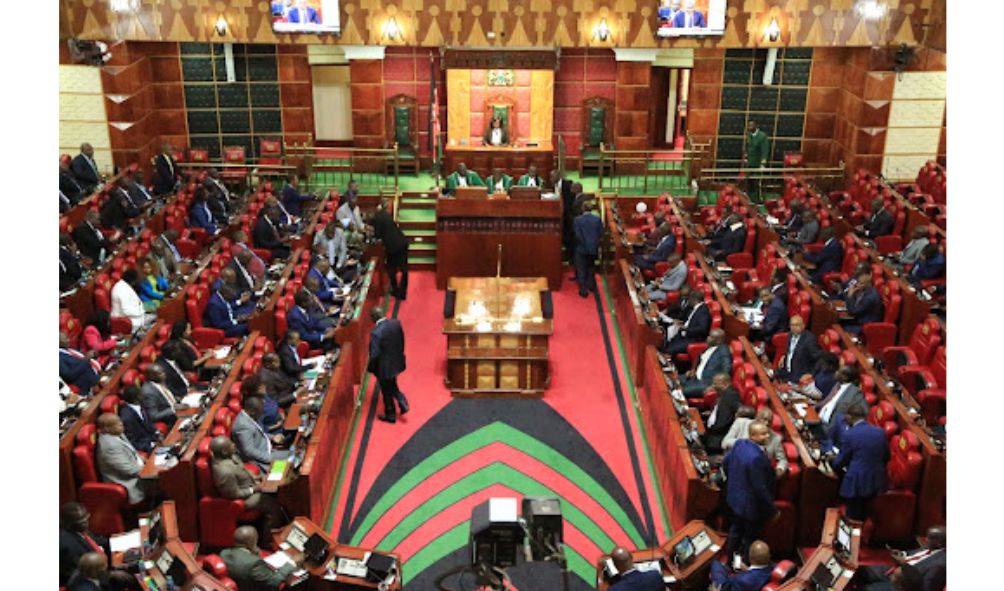Parliament Rejects Three Finance Bill 2023 Changes Amidst Opposition-Government Clash
Members of Parliament rejected three amendments to the Finance Bill 2023. During its Third Reading on Tuesday, June 20, due to opposition and government disagreements over contentious clauses.
Despite the ardent defense and substantial justification of the opposition’s proposals, the majority side categorically rejected them, leaving the opposition short of the necessary number of votes.
After the electronic voting system failed during the Third Reading, the House resorted to manual voting on particular clauses.
Unacceptable Clauses
James Nyikal, a Seme representative, proposed an amendment to the definition of digital content monetization that would impose a 3 percent withholding tax on content creators.
Makali Mulu, a representative for Kitui Central, supported his amendment, describing the proposal as extremely unfair.
189 members of parliament voted against the amendment, while 87 voted for it.
Rental Income Tax
Under this proposal, property managers would be required to deduct and remit rental income tax within twenty-four hours of receiving tenant payments.
ALSO READ: Azimio Coalition Walks Out as Trade CS Appears in Senate
The clause stipulated that agents appointed by the Kenya Revenue Authority (KRA) commissioner in charge of domestic taxes would collect the tax.
Wilberforce Ojiambo Oundo, a representative for Funyula, proposed an amendment that would require real estate agents to remit the tax within three days as opposed to 24 hours.
The proposed legislation was, however, rejected.
Digital Monetisation
MP Nyikal proposed an amendment to clause 24 of the bill, which dealt with the elimination of income tax on the creation of digital content. Wilburforce Ojiambo Oundo (Funyula) and Robert Mbui (Kathiani) supported his proposal. The proposed amendment aimed to reduce the tax from 15 percent to five percent.
Nyikal expressed concern that the tax proposal could have negative effects on the ability of young content creators to support themselves financially.
He emphasized that imposing stringent regulations on creatives during a period of high unemployment would impede revenue generation.
Gathoni Wamuchomba, a representative from Githunguri, concurred, arguing that the legislation was retrogressive.
Wamuchomba was one of the Ruto-aligned legislators who opposed the Finance Bill, straining her relations with the President and Kenya Kwanza politicians.
ALSO READ: Nairobi Woman Representative Esther Passaris Slams Fake Reports, Denies Asking Raila Odinga to Stop Contacting Her
“In my opinion, the people who are heavily involved in digital monetization are young people, and the majority of them are under the age of 35.” Dealing with this group of Kenyans as if they were any other group of professionals and imposing the 15% reduction to 5%, I still believe we are not being very fair to this group of digital monetizes,” she said.
The amendment was, however, rejected.
Acceptable Clauses
Betting
Kuria Kimani, chair of the Finance and Planning Committee of the National Assembly, proposed an amendment to Clause 2 that would target betting excise taxes.
Initially, the bill proposed including wagered amounts in the computation of withholding tax, which would have increased the industry’s revenue.
The representative proposed that the amount wagered be deducted from the withholding tax, which was approved by the House.
Double Taxation
The chair of the Finance Committee also proposed an amendment to Section 5 of the Income Tax Act that would permit the deduction of club entrance and subscription fees against the employer’s income.
ALSO READ: Nairobi Senator Sifuna Hints at Azimio la Umoja’s Street Protest after Controversial Finance Bill Passage
The initial proposal suggested that both the employer and employee would be required to pay taxes.
Nonetheless, Kimani argued that such double taxation would not apply to the same payment, and the House ultimately approved this amendment.
Digital Asset Tax
The Finance Bill proposed that taxes on digital assets be paid to the revenue authority within twenty-four hours.
Kimani advocated for the retention of the law, which was in stark contrast to the position of several legislators who wanted the collection periods extended to five working days.
Housing Fund
Kuria Kimani proposed an amendment to Clause 11, which would permit the government to deduct a 1.5% Housing tax from employees and employers.
This clause will allow an employer’s contribution to the housing levy to be a tax-deductible expense when calculating the employer’s corporation tax. Kimani proposed the amendment, which received approval.
Earlier, lawmakers eliminated the Ksh2,500 limit on the Housing Fund.
Parliament Rejects Three Finance Bill 2023 Changes Amidst Opposition-Government Clash
HEY READER. PLEASE SUPPORT THIS SITE BY CLICKING ADS. DON’T FORGET TO HIT THE NOTIFICATION BELL FOR MORE UPDATES AROUND THE GLOBE.
